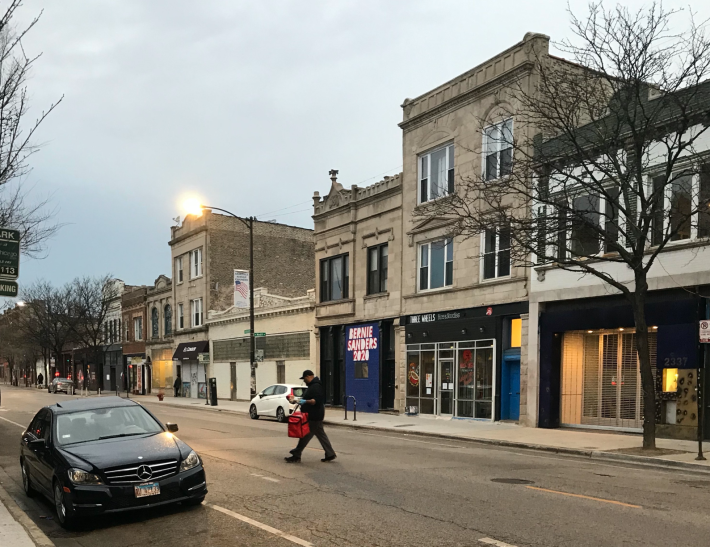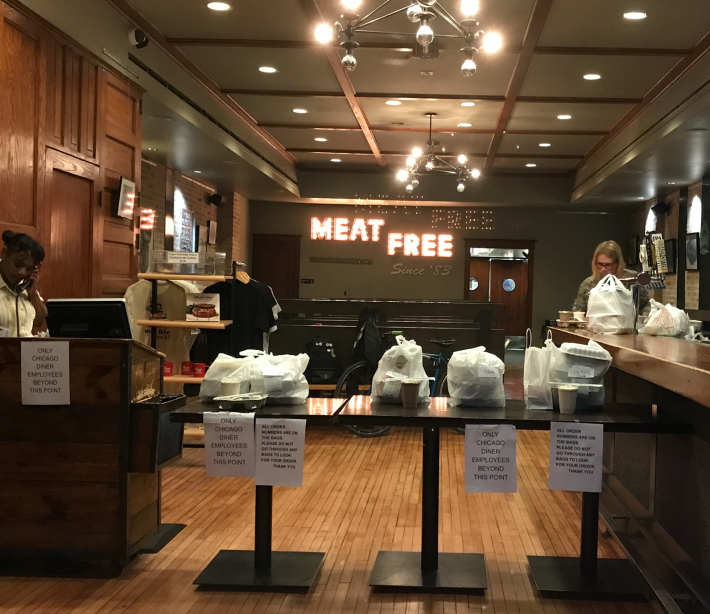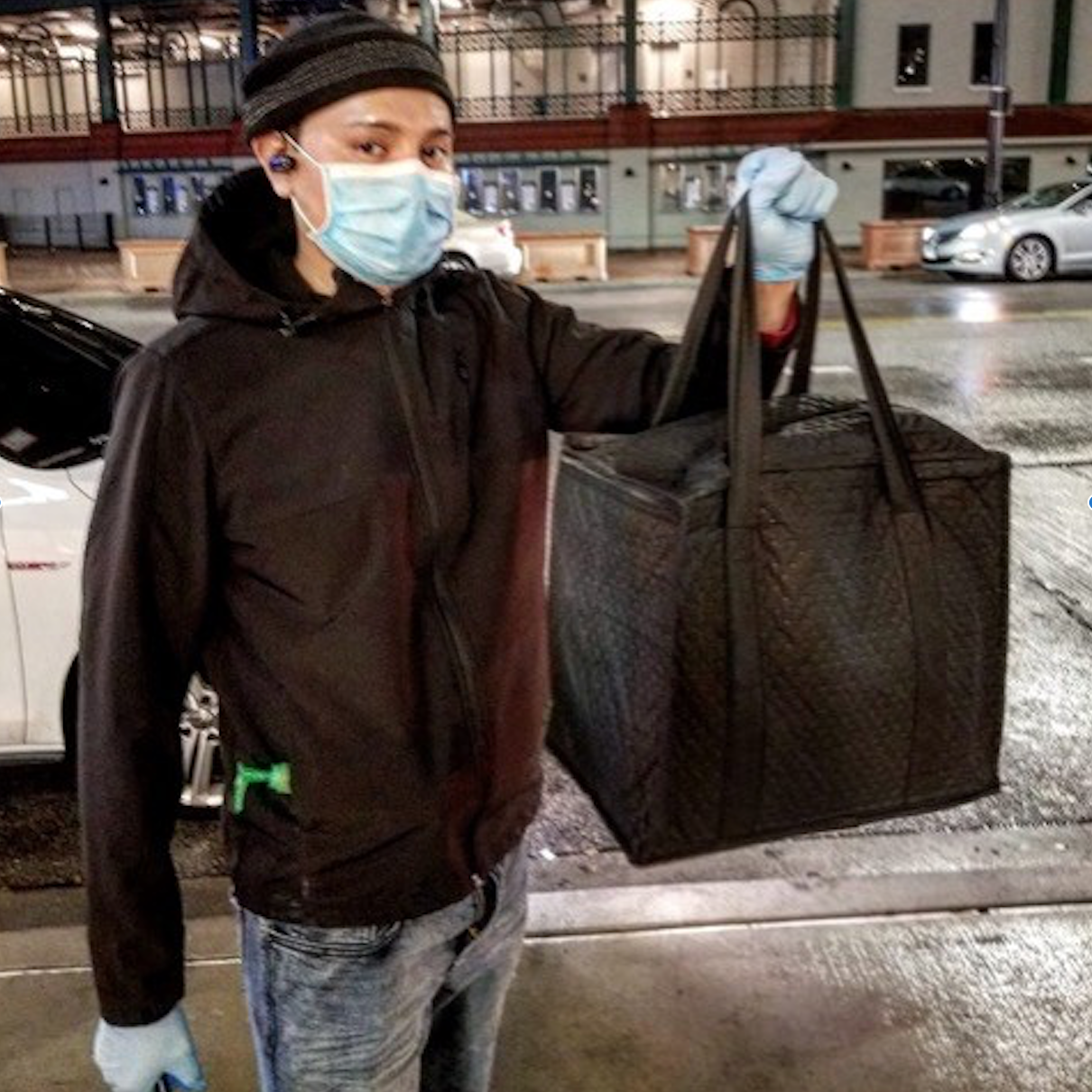Like many of us, Postmates food delivery driver Jared Haberman thought Illinois' ban on dining in restaurants, which started on March 16 as a strategy to slow COVID-19 spread, would only last a few weeks. It will blow over soon, he thought. That was almost a month ago. But he was wrong: Governor J.B. Pritzker’s full Stay at Home order, which started on March 21 and closed all non-essential businesses, has been extended through April 30, a sign that our state is nowhere near out of the woods when it comes to the pandemic.
Haberman is one of the hundreds Chicago-area restaurant delivery workers who have been affected by the coronavirus closures. As many or most residents hunker down at home to wait out the virus, Haberman is still working, but has to start working different hours in order to make enough money. That’s because the field is seeing more competition as many delivery apps have incentivized hiring more workers who are out of jobs due to other business closures to keep up with growing food delivery demand and offer a helping hand to those facing income loss.
“The week that we started this quarantine, the deliveries dropped by a lot,” Haberman said. “I think it was because people were at home cooking for their families." He’s also noticed increased competition, which is why he now tries to work from around 9:30 a.m. until about 2:30 p.m. Then he takes a break and works dinner time, which he said is still fairly busy. But now he averages about six hours a day, versus nine hours pre-quarantine. He explained that he's working fewer hours because overall there is less work to be had, so he's working when the most orders are available, rather than wait around for a few orders over all nine hours.
With so most people at home, parking on residential streets has gotten tighter, making deliveries less convenient. And even on retail strips, where the parking lanes are generally pretty empty nowadays, parking near restaurants served by lots of delivery drivers can be tricky. Haberman learned that the hard way last month after the no dine-in rule went into effect. When he parked in a tow zone while running into a downtown Taco Bell for a pickup, his vehicle was towed.

Haberman, a Logan Square resident and artist, has found success starting work in Avondale, then heading up north to Uptown and Andersonville. Sometimes he goes downtown before driving back towards Logan as dinner approaches.
Fortunately, most deliveries now are no-contact, a new option rolled out by delivery apps to reduce direct interaction, which Haberman said is easier and makes him feel safer. Like the majority of delivery drivers nowadays, he wears gloves and a mask.
Postmates, along with several other companies, rolled out a new relief fund to help drivers with coronavirus-related medical expenses. Haberman said he appreciates that support.
DoorDash (which also owns Caviar), Uber Eats, and GrubHub have also set up a relief fund for drivers and restaurants impacted by the crisis. (Note that you can help out local restaurants during the crisis by picking up your own food when possible, so that they don't have to pay fees to third-party delivery services. - Ed)
Suburban driver James, who declined to give his last name, said that like Haberman, he's pleased that DoorDash, one of the companies he drives for, is helping out workers. The company delivered over 1 million sets of free hand sanitizer and gloves to all of its drivers, which James received in March. And while he appreciated the gesture, James said he has not been wearing the gloves because he feels washing his hands often is more effective. He also said he isn’t wearing a mask, since most of his deliveries are no-contact. “Personally I'm just not that worried as long as I wash my hands and use hand sanitizer,” James said.
James, who lives in Schaumburg and delivers to the Northwest suburbs, is a full-time delivery driver. He said that these days, tips are better on GrubHub but DoorDash is generally busier, especially for the dinner rush.
James said he has noticed drivers vying for orders as competition increases, which has led him to be picky about what he accepts. He said he used to do 13-15 deliveries a day, but now he's down to about seven, which averages about $130 a night as opposed to $150 or higher.
“I've put on over 30,000 miles on my car in the last year," he explained. "I do 100 miles, almost every day — that's 700 plus miles a week,” he said. “If I took every order that came my way, it wouldn't be profitable for me.”
Drivers are more reliant on tips and higher-end restaurants now, James said. But as more restaurants decide they can't make ends meet on takeout sales only, and close their doors, delivery drivers aren’t sure what the future holds. James said he’s saving up money; Haberman said he’s taking more orders from grocery and pet supply stores.

In addition to having to optimize their delivery strategies to make enough money during the pandemic, some drivers say another hassle is the lack of restroom access, since some restaurants don't let drivers use their bathrooms. For Nick Russell, who drives with DoorDash as a side gig to his full-time job as a restaurant manager, finding a place to use the restroom requires strategic route planning to use the facilities at driver-friendly establishments.
“The restaurants and the gas stations know that we're out here and know we're part of the ‘essential group’, so they’re open for us because they know we’re doing a thing for the people right now,” Russell said. “So, it's kind of like one big community.”
Russell has been with DoorDash on and off since 2016 and usually delivers in the city as well as the suburbs, but as of late he stays in the northwest-suburban Des Plaines, Park Ridge, and Niles area to avoid dealing with parking hassles. He is stocked up on Clorox wipes, hand sanitizer and gloves from his other job and said he feels safe working.
With decent business lately in his area, Russell said he is not worried about finances and feels positively about delivery work right now because his customers have generally been appreciative of his work and have tipped him fairly. He said accepts every order he gets, noting that you never know a person’s situation.
“I'm not just in this to keep my money up," Russell explained. "I'm in it because I know that not everybody is in the position to cook. There might be a family out there whose kids can't go to school, obviously, but whose parents are part of the essential group, and they got to work so [the kids] got to eat somehow.”
Russell said the importance of delivery work has never been greater than during the crisis. While medical professionals are on the front line of pandemic response, he noted that delivery drivers are too, in a sense.
“We're definitely the unsung heroes because if we're not out here providing food [then] there's no way that families can leave their house, or they choose not to because they're scared to get sick,” Russell said. “That's what keeps me continuously going and I will keep on coming out here when I can just to make sure that people got supplies and can eat.”
Here are some tips on preventing the spread of COVID-19, and advice for Chicagoans on what to do if you think you may have been exposed to the virus.




